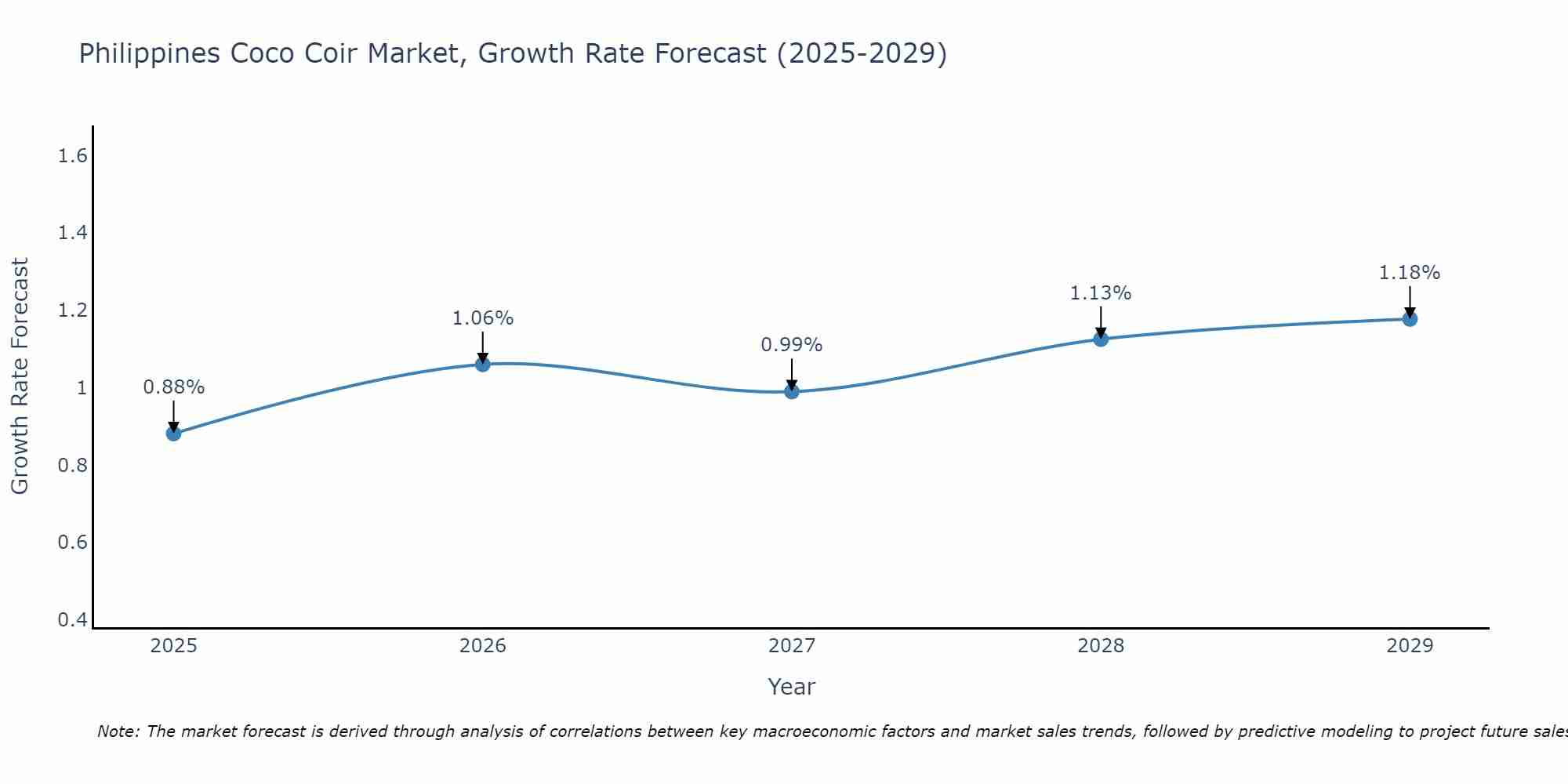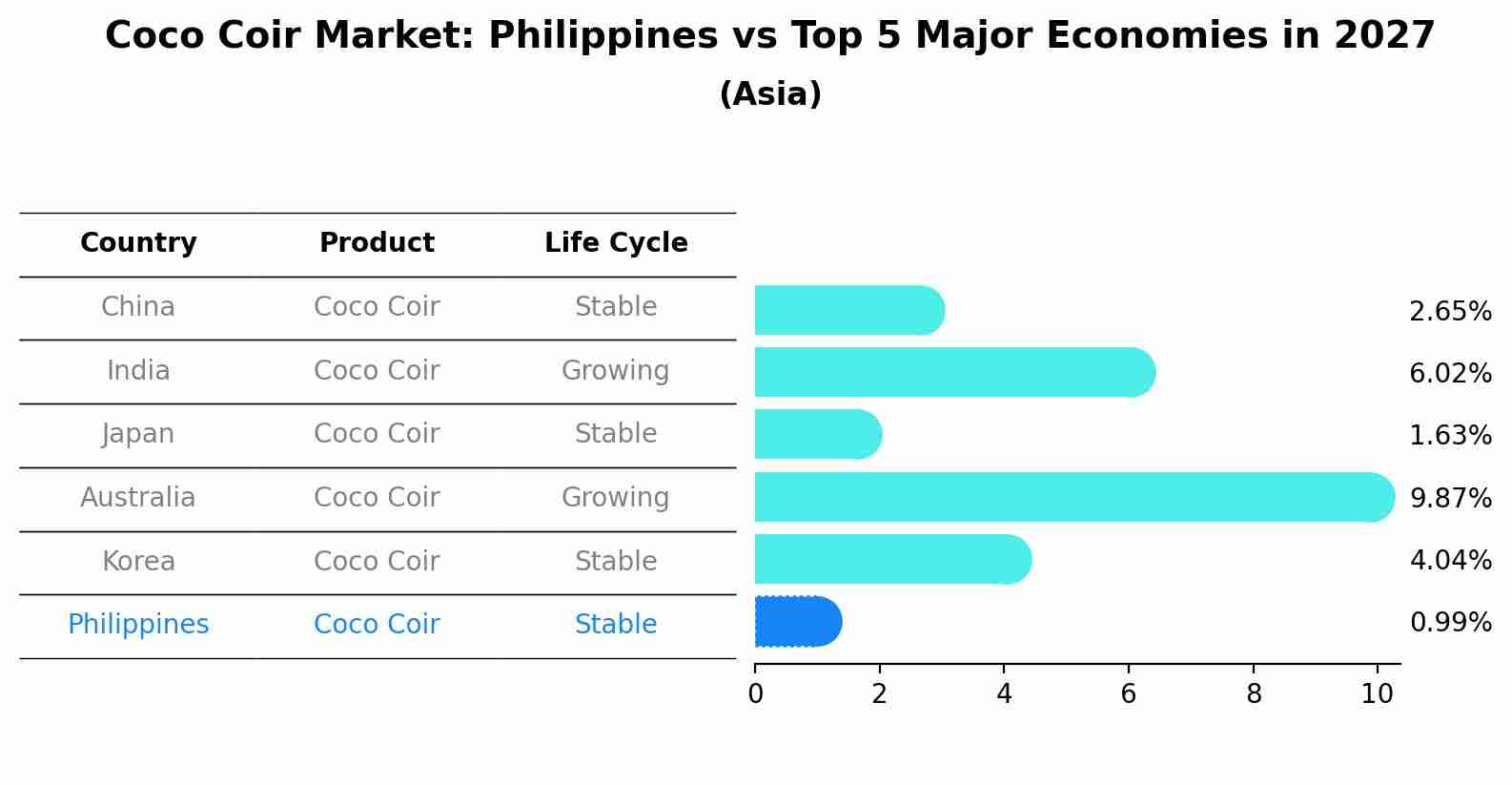Philippines Coco Coir Market (2025-2031) Outlook | Forecast, Analysis, Growth, Industry, Value, Trends, Share, Companies, Revenue & Size
| Product Code: ETC373709 | Publication Date: Aug 2022 | Updated Date: Apr 2025 | Product Type: Market Research Report | |
| Publisher: 6Wresearch | Author: Ravi Bhandari | No. of Pages: 75 | No. of Figures: 35 | No. of Tables: 20 |
Philippines Coco Coir Market Size Growth Rate
The Philippines Coco Coir Market is projected to witness mixed growth rate patterns during 2025 to 2029. From 0.88% in 2025, the growth rate steadily ascends to 1.18% in 2029.

Coco Coir Market: Philippines vs Top 5 Major Economies in 2027 (Asia)
By 2027, the Coco Coir market in Philippines is anticipated to reach a growth rate of 0.99%, as part of an increasingly competitive Asia region, where China remains at the forefront, supported by India, Japan, Australia and South Korea, driving innovations and market adoption across sectors.

philippines coco coir market Synopsis
The Philippines coco coir market was valued at USD 14 million in 2025 and is expected to reach nearly USD 24 million by 2025, growing at a CAGR of 8. 2% during the forecast period. The growth is attributed to increased awareness regarding sustainable farming practices among local farmers along with rising demand for organic fertilizers among consumers due environmental concerns associated with chemical fertilizers usage. In addition, government initiatives aimed towards promoting efficient water management systems have also supported this growth trend over recent years.
Drivers of the Market
The Philippines coco coir market is on an upward trajectory due to its eco-friendly properties and multiple applications. Coco coir`s use in gardening, agriculture, and erosion control solutions aligns with the growing demand for sustainable practices. As environmental concerns and organic farming gain prominence, coco coir`s natural and biodegradable characteristics contribute to market growth. International demand for eco-friendly products also provides export opportunities.
Challenges of the Market
The Philippines coco coir market encounters obstacles despite the country`s significant coconut industry. One of the major challenges is the variability in the supply of quality coco coir due to factors like climate change and agricultural practices. This inconsistency affects product quality and may lead to dissatisfaction among customers. Moreover, global market competition and the need for sustainable production processes pose challenges to the industry`s growth. As consumers become more environmentally conscious, coco coir producers face the task of balancing ecological concerns with economic viability.
COVID-19 Impact on the Market
In the agricultural sector, the coco coir market, a vital component of horticulture and soil improvement, experienced challenges due to transportation restrictions and labor shortages.
Key Players in the Market
Coco coir products have gained popularity in the Philippines due to their eco-friendly and sustainable nature. Key players in this market, such as XYZ Coir Industries and ABC Coco Crafts, are engaged in the production of a wide range of coco coir-based products, including doormats, carpets, and gardening items. These companies are known for their innovative use of coconut husk fibers and their contributions to waste reduction. By catering to the growing demand for environmentally conscious products, these key players have established themselves as influencers in the coco coir market.
Key Highlights of the Report:
- Philippines Coco Coir Market Outlook
- Market Size of Philippines Coco Coir Market, 2024
- Forecast of Philippines Coco Coir Market, 2031
- Historical Data and Forecast of Philippines Coco Coir Revenues & Volume for the Period 2021-2031
- Philippines Coco Coir Market Trend Evolution
- Philippines Coco Coir Market Drivers and Challenges
- Philippines Coco Coir Price Trends
- Philippines Coco Coir Porter's Five Forces
- Philippines Coco Coir Industry Life Cycle
- Historical Data and Forecast of Philippines Coco Coir Market Revenues & Volume By Product for the Period 2021-2031
- Historical Data and Forecast of Philippines Coco Coir Market Revenues & Volume By Coco Coir Grow Bags for the Period 2021-2031
- Historical Data and Forecast of Philippines Coco Coir Market Revenues & Volume By Bales for the Period 2021-2031
- Historical Data and Forecast of Philippines Coco Coir Market Revenues & Volume By Coir Material for the Period 2021-2031
- Historical Data and Forecast of Philippines Coco Coir Market Revenues & Volume By Open Tops for the Period 2021-2031
- Historical Data and Forecast of Philippines Coco Coir Market Revenues & Volume By Blends & Loose Substrate for the Period 2021-2031
- Historical Data and Forecast of Philippines Coco Coir Market Revenues & Volume By Others for the Period 2021-2031
- Historical Data and Forecast of Philippines Coco Coir Market Revenues & Volume By Application for the Period 2021-2031
- Historical Data and Forecast of Philippines Coco Coir Market Revenues & Volume By Rope & Cordage for the Period 2021-2031
- Historical Data and Forecast of Philippines Coco Coir Market Revenues & Volume By Coco Nets & Twines for the Period 2021-2031
- Historical Data and Forecast of Philippines Coco Coir Market Revenues & Volume By Stitched Mats for the Period 2021-2031
- Historical Data and Forecast of Philippines Coco Coir Market Revenues & Volume By Coconut Meals for the Period 2021-2031
- Historical Data and Forecast of Philippines Coco Coir Market Revenues & Volume By Husk for the Period 2021-2031
- Historical Data and Forecast of Philippines Coco Coir Market Revenues & Volume By Others for the Period 2021-2031
- Historical Data and Forecast of Philippines Coco Coir Market Revenues & Volume By Consumer for the Period 2021-2031
- Historical Data and Forecast of Philippines Coco Coir Market Revenues & Volume By Green Houses for the Period 2021-2031
- Historical Data and Forecast of Philippines Coco Coir Market Revenues & Volume By Sellers for the Period 2021-2031
- Philippines Coco Coir Import Export Trade Statistics
- Market Opportunity Assessment By Product
- Market Opportunity Assessment By Application
- Market Opportunity Assessment By Consumer
- Philippines Coco Coir Top Companies Market Share
- Philippines Coco Coir Competitive Benchmarking By Technical and Operational Parameters
- Philippines Coco Coir Company Profiles
- Philippines Coco Coir Key Strategic Recommendations
Frequently Asked Questions About the Market Study (FAQs):
Export potential assessment - trade Analytics for 2030
Export potential enables firms to identify high-growth global markets with greater confidence by combining advanced trade intelligence with a structured quantitative methodology. The framework analyzes emerging demand trends and country-level import patterns while integrating macroeconomic and trade datasets such as GDP and population forecasts, bilateral import–export flows, tariff structures, elasticity differentials between developed and developing economies, geographic distance, and import demand projections. Using weighted trade values from 2020–2024 as the base period to project country-to-country export potential for 2030, these inputs are operationalized through calculated drivers such as gravity model parameters, tariff impact factors, and projected GDP per-capita growth. Through an analysis of hidden potentials, demand hotspots, and market conditions that are most favorable to success, this method enables firms to focus on target countries, maximize returns, and global expansion with data, backed by accuracy.
By factoring in the projected importer demand gap that is currently unmet and could be potential opportunity, it identifies the potential for the Exporter (Country) among 190 countries, against the general trade analysis, which identifies the biggest importer or exporter.
To discover high-growth global markets and optimize your business strategy:
Click Here- Single User License$ 1,995
- Department License$ 2,400
- Site License$ 3,120
- Global License$ 3,795
Search
Thought Leadership and Analyst Meet
Our Clients
Related Reports
- India Switchgear Market Outlook (2026 - 2032) | Size, Share, Trends, Growth, Revenue, Forecast, Analysis, Value, Outlook
- Pakistan Contraceptive Implants Market (2025-2031) | Demand, Growth, Size, Share, Industry, Pricing Analysis, Competitive, Strategic Insights, Strategy, Consumer Insights, Analysis, Investment Trends, Opportunities, Revenue, Segments, Value, Segmentation, Supply, Forecast, Restraints, Outlook, Competition, Drivers, Trends, Companies, Challenges
- Sri Lanka Packaging Market (2026-2032) | Outlook, Competition, Drivers, Trends, Demand, Pricing Analysis, Competitive, Strategic Insights, Companies, Challenges, Strategy, Consumer Insights, Analysis, Investment Trends, Opportunities, Growth, Size, Share, Industry, Revenue, Segments, Value, Segmentation, Supply, Forecast, Restraints
- India Kids Watches Market (2026-2032) | Strategy, Consumer Insights, Analysis, Investment Trends, Opportunities, Growth, Size, Share, Industry, Revenue, Segments, Value, Segmentation, Supply, Forecast, Restraints, Outlook, Competition, Drivers, Trends, Demand, Pricing Analysis, Competitive, Strategic Insights, Companies, Challenges
- Saudi Arabia Core Assurance Service Market (2025-2031) | Strategy, Consumer Insights, Analysis, Investment Trends, Opportunities, Growth, Size, Share, Industry, Revenue, Segments, Value, Segmentation, Supply, Forecast, Restraints, Outlook, Competition, Drivers, Trends, Demand, Pricing Analysis, Competitive, Strategic Insights, Companies, Challenges
- Romania Uninterruptible Power Supply (UPS) Market (2026-2032) | Industry, Analysis, Revenue, Size, Forecast, Outlook, Value, Trends, Share, Growth & Companies
- Saudi Arabia Car Window Tinting Film, Paint Protection Film (PPF), and Ceramic Coating Market (2025-2031) | Strategy, Consumer Insights, Analysis, Investment Trends, Opportunities, Growth, Size, Share, Industry, Revenue, Segments, Value, Segmentation, Supply, Forecast, Restraints, Outlook, Competition, Drivers, Trends, Demand, Pricing Analysis, Competitive, Strategic Insights, Companies, Challenges
- South Africa Stationery Market (2025-2031) | Share, Size, Industry, Value, Growth, Revenue, Analysis, Trends, Segmentation & Outlook
- Afghanistan Rocking Chairs And Adirondack Chairs Market (2026-2032) | Size & Revenue, Competitive Landscape, Share, Segmentation, Industry, Value, Outlook, Analysis, Trends, Growth, Forecast, Companies
- Afghanistan Apparel Market (2026-2032) | Growth, Outlook, Industry, Segmentation, Forecast, Size, Companies, Trends, Value, Share, Analysis & Revenue
Industry Events and Analyst Meet
Whitepaper
- Middle East & Africa Commercial Security Market Click here to view more.
- Middle East & Africa Fire Safety Systems & Equipment Market Click here to view more.
- GCC Drone Market Click here to view more.
- Middle East Lighting Fixture Market Click here to view more.
- GCC Physical & Perimeter Security Market Click here to view more.
6WResearch In News
- Doha a strategic location for EV manufacturing hub: IPA Qatar
- Demand for luxury TVs surging in the GCC, says Samsung
- Empowering Growth: The Thriving Journey of Bangladesh’s Cable Industry
- Demand for luxury TVs surging in the GCC, says Samsung
- Video call with a traditional healer? Once unthinkable, it’s now common in South Africa
- Intelligent Buildings To Smooth GCC’s Path To Net Zero


















